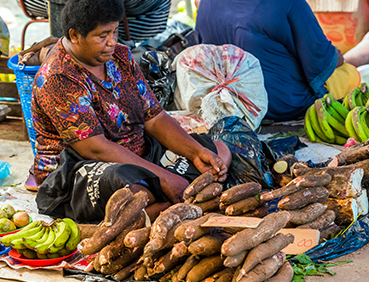IDM at the World Bank, February 2017
At the beginning of February 2017, the World Bank convened a high level workshop on Individual Poverty Measurement at its headquarters in Washington. It brought together people working on various aspects of individual poverty measurement from different organisations, disciplines and geographies across the globe. Helen Suich (ANU) and Joanne Crawford (IWDA) were invited to contribute to the session on Research Frontiers, updating participants on the Individual Deprivation Measure as a contribution to advancing gender-sensitive, individual-level poverty measurement.
The workshop was an opportunity to assess the issues and challenges with current household level measurement of poverty, review a range of work underway towards individual level measurement, consider issues and challenges involved in changing measurement approaches at a global level, and outline potential pathways towards change.
For the IDM team, it was an opportunity to introduce the participatory research underpinning the IDM, alert participants to the current work to ready the IDM for global use, hear and contribute to discussions about why and how to move to individual-level measurement of poverty, and influence directions and priorities.
Compelling evidence was presented by Colombia University economist Ravi Kanbur that ignoring intrahousehold inequality by measuring poverty at a household level leads to underestimating global inequality by around a third, and also to overestimating the effect of growth on poverty reduction. Kanbur also argued that this may help explain why there is an apparent disconnect between official numbers reporting improvement in poverty levels and the perceptions of people on the ground. His analysis underlined the importance of measuring poverty at the individual level, and in a way that provides insight into inequality within, not just between, households, if measurement is to give us a clear picture of the situation of individuals, who is benefiting and who is being left behind.
For the IDM team, the workshop was enormously valuable, providing insight into how key individuals and institutions see the limitations of existing data, the research and institutional landscape, and technical issues and opportunities. We connected with many key players and current and planned work which will assist us to ready the IDM for global use in a way that complements and builds on other work. Discussions directly informed our thinking in relation to sample design, comparability, assets measurement, and data base design and access. We shared what the IDM offers as a methodology for individual-level, gender-sensitive poverty measurement, and contributed to direction setting on next steps and the medium term research and data agenda for the World Bank.
The workshop outcomes were positive in terms of steps towards individual poverty measurement. There was clear recognition of the limitations of household level measurement; that the disaggregation of data that is possible now is limited and misleading; that technical issues in moving from household to individual measurement need to be addressed; that current data limitations (in terms of individual measurement) need to be addressed; and that more research is needed on various pathways to individual poverty measurement.
The way forward that emerged holds the space and resources for further research and data collection, rather than rush decisions on the integration of gender in the Bank’s reporting for the next Poverty and Shared Prosperity Report (due end 2018). It was proposed that this report proceed in a manner broadly consistent with the previous report, with an additional chapter on the limitations of household level data, research currently underway and various approaches to individual poverty measurement. The Bank would also engage in further research, investigation and data collection, including by working in partnership with researchers outside the Bank, to clarify options and support the move towards individual level measurement.
The closing summary from the co-convenor of the workshop, Francisco Ferreiro (Senior Adviser, Development Research Group at the World Bank) referenced the IDM as one potential model for individual poverty measurement, alongside the Multidimensional Poverty Index and econometric approaches. Essentially, the conclusion was that there is more thinking to be done, promising work is underway, the Bank will wait to resolve its approach, and work with the people doing this work to make its decisions.
—


Comments